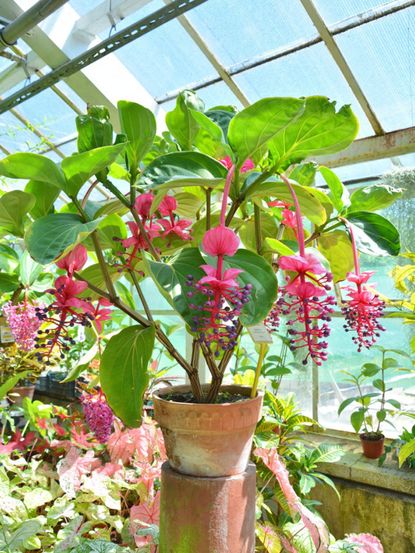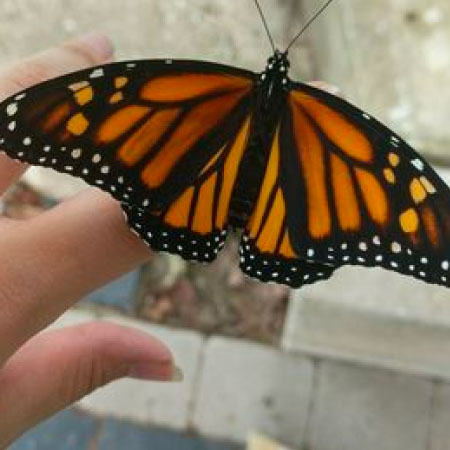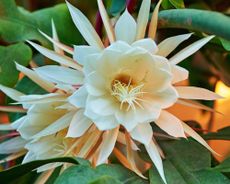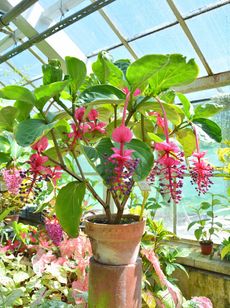Medinilla Information – Tips On Caring For Medinilla Plants


Sometimes called "Rose Grape", "Philipinne Orchid", "Pink Lantern plant" or "Chandelier tree", Medinilla magnifica is a small evergreen shrub native to the Philippines where it is usually found growing on trees in tropical forests.
However, Medinilla has been grown for hundreds of years as an exotic houseplant, once prized in Belgium by the wealthy and noble. Learn how you, too, can grow this exotic species.
Medinilla Information
Medinilla is a tropical shrub that can grow up to 4 ft. (1 m.) tall. It grows like epiphytic orchids, in the holes and crotches of trees. Unlike orchids, though, Medinilla does not absorb atmospheric moisture and nutrients via velamen (the corky epidermis of aerial roots).
Instead, the plant has large succulent green leaves, which hold onto or store moisture similar to other succulent plants. In late spring to early summer, the plant is covered by drooping clusters of delicate pink flowers that look somewhat like grapes or wisteria flowers. These flowers are what gives the plant all its folk names.
How to Grow Medinilla Plants
Medinilla needs a warm and humid environment to survive. It cannot tolerate temperatures below 50 degrees F. (10 C.). In fact, 63-77 degrees F. (17-25 C.) is ideal for proper Medinilla plant care. It prefers warm days in high, but filtered light and cooler nights in the 60s (16 to 21 C.). Cooler nights help the plant to send out more flowers. Before purchasing Medinilla, be sure you can give it the warm, humid conditions it needs year round.
As a succulent, Medinilla does not need to be watered often, usually just thoroughly once a week. It does enjoy being misted by water often, especially in the dry winter months. If you have Medinilla as a houseplant, you may need to run a humidifier in the home during winter. Also, be sure to keep Medinilla plants away from air ducts and drafty windows.
Medinilla Plant Care Instructions
Caring for Medinilla plants isn’t difficult once you know what it needs. Grow the plant in filtered shade to full sun, though it prefers to avoid direct afternoon sun. During the flowering period, deadhead spent blooms to promote new flowers and keep the plant healthy looking. After the flowering period, give Medinilla regular houseplant or orchid fertilizer. At this point, your Medinilla can be cut back to keep under control and create bushier new growth. Be sure to leave at least one leaf set on each stalk you cut, or that stalk will die back completely.
Gardening tips, videos, info and more delivered right to your inbox!
Sign up for the Gardening Know How newsletter today and receive a free download of our most popular eBook "How to Grow Delicious Tomatoes."
If you need to repot your Medinilla, do it after the flowering season. Repotting is an excellent time for Medinilla plant propagation, as the easiest way to create new Medinilla plants is by dividing an existing plant. When the time comes that your Medinilla has out grown its pot, just divide the plant into several new pots.
-
 5 Night-Blooming Houseplants – Grow An Indoor Moon Garden
5 Night-Blooming Houseplants – Grow An Indoor Moon GardenThere is something uniquely special about night-blooming houseplants. Set the scene for a magical evening indoors with these fragrant flowering beauties.
By Amy Grant
-
 Beautiful Butterfly Garden Ideas: 10 Ways To Attract Pretty Pollinators To Your Yard
Beautiful Butterfly Garden Ideas: 10 Ways To Attract Pretty Pollinators To Your YardBringing butterflies to your backyard is one of the most important ways you can enhance wildlife, boost pollination and improve biodiversity. These 10 butterfly garden ideas can get you started
By Mary Ellen Ellis
